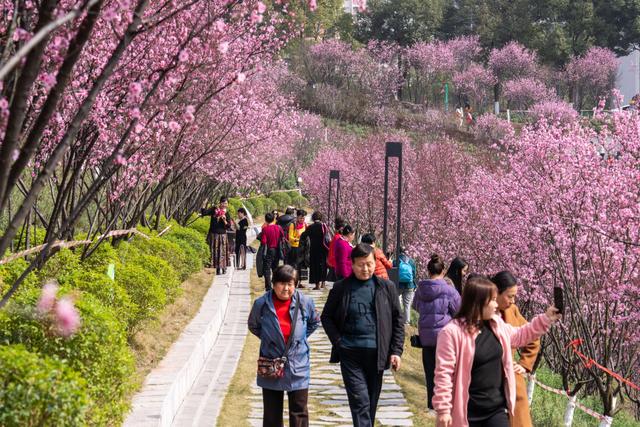





Editor’s Note: Today’s real estate industry in China is the hardest hit by collusion between officials and businessmen. Jiang Renjie, the former vice mayor of Suzhou, took bribes of more than 100 million yuan, mainly from real estate developers. Recently, it is far more than this one who has been pulled down by developers: Zhu Zhigang, the former vice minister of finance, was "double-regulated" and helped his relatives buy low-priced houses, involving many people in the real estate industry in Beijing; Liu Zhihua, the former vice mayor of Beijing, was sentenced to death with a suspended sentence for taking bribes of nearly 7 million yuan. He accepted a lot of bribes from real estate developers … The arms of corrupt officials "warmed" real estate developers, and the wealthy real estate developers "fed back" individual officials again and again. The essence behind this "mutual benefit" is only two words: power and benefit.
There are deep roots behind the fact that officials are willing to do anything for developers at the risk of guillotine.
Why are individual officials keen to be "friends" with developers? Why is the problem of illegal land getting worse and worse? In fact, as long as there is soil or space for power rent-seeking, corruption will grow like weeds cut one after another, which has been clearly verified in the real estate market. Originally, there was a "symbiosis" phenomenon between developers and urban construction officials. Developers were both "performance promoters" of individual urban construction officials and "troublemakers" who induced corruption. When the two sides share the same rotten tastes, they often form an "interest alliance", and land development has thus become a high-risk area for corruption. There are deep roots behind the fact that individual officials are willing to do anything for developers at the risk of going to the guillotine.
The government plays a dual role; The hierarchical administrative structure makes the power lack of restraint.
To a certain extent, the government plays a dual role. On the one hand, the government, as the representative of public interests, formulates policies, regulates economic activities and acts as a referee. The government has the power to examine and approve infrastructure, industry, real estate and other projects. The construction of these projects requires land. Some unscrupulous developers want to obtain low-priced land and rent from individual government officials who can’t resist the temptation.
On the other hand, the government has a huge amount of resources and directly participates in economic activities as a subject and acts as an athlete. All local governments shoulder the heavy responsibility of developing local economy. In the performance evaluation of local government officials, GDP is the most critical indicator, which intensifies their impulse to manage land. Because they can only use land to attract investment, set up industrial parks and carry out infrastructure construction. In these activities, the pricing power of land resources is in the hands of relevant officials. Even the public bidding and auction of land can not completely overcome the transfer of interests. The direct investment attraction of individual local party and government departments is more likely to aggravate the difficulty of curbing land violations and corruption.
In addition, the hierarchical administrative structure makes the top leaders of local governments and the direct leaders in charge of land have too much power and lack of supervision and checks and balances. China’s land authorities are land departments at all levels, but the land department is a subordinate department of the government. The director of land and resources should be led by the deputy mayor in charge, and the deputy mayor in charge should be led by the mayor and the secretary. If the deputy mayor, mayor and secretary in charge directly grant land or intervene in land transactions, it will be difficult for the land department to effectively restrain them, and the discipline inspection and supervision departments will also encounter difficulties and resistance when investigating. High-ranking officials who are dismissed because of land corruption are basically deputy mayors and district heads in charge of land, urban construction or major construction projects. Unrestricted power naturally leads to corruption.
The relevant laws do not strictly define the public interest.
On the one hand, the constitution stipulates that urban land belongs to the state and rural land belongs to farmers’ collectives, which means that all the new land needs of urbanization and industrialization, whether the needs of public interests or non-public interests, must be met through the state’s land acquisition behavior (that is, transforming rural collectively owned land into state-owned land); On the other hand, the constitution also emphasizes that the state can only expropriate or requisition agricultural land for the needs of public interests.
It is precisely because the relevant laws do not strictly define the public interest, and the government must expropriate farmers’ land for non-public welfare needs such as economic development and urban construction. Although many land expropriation acts of individual local governments are illegal, the judicial department usually refuses to accept most legal proceedings caused by illegal land expropriation by the government, which to some extent opens the door for land corruption of individual local government officials.
Except for a few stocks of state-owned land, all new urban construction land must be acquired through land acquisition, and the main body of land acquisition is only the government. The circulation of village collective land is strictly restricted to agricultural use, so the government has mastered the supply of construction land. In the case of rising demand, developers understand that only by "fixing" government officials can they obtain land at a lower cost. This is why some government officials "wave upon wave" fall on land violations. Monopoly of land supply has created institutional space for individual corrupt officials to use land for illegal interests.
Under the tax-sharing system, local governments are constantly looking for income from outside the budget, and land lease income is not included in the financial budget management.
After the implementation of the tax-sharing system in 1994, the central government quickly took the leading position, and its concentration capacity became stronger and stronger, and its concentration ratio became higher and higher, accounting for about 55% of the total tax revenue. The central government is rich in money and the local government is poor in money, but the pattern of division of powers between the central and local governments has not changed much. Local governments use about 45% of their relative fiscal revenue to support about 75% of their relative expenditure responsibilities. This induces local governments to constantly look for sources of income from outside the budget. When local governments found that land was an important way to make money, they began to sell land to raise financial revenue for themselves.
The tax classification of the tax-sharing system also gives local governments an incentive to develop the real estate industry and constantly push up housing prices. According to the tax-sharing arrangement, urban land use tax, property tax, stamp duty, land value-added tax, paid use income of state-owned land and other taxes are collected by local governments. Therefore, the more active the real estate market is, the more this part of tax revenue will be. This has stimulated the impulse of local governments to develop the real estate industry and collected a large number of agricultural land to develop the real estate industry. While the real estate industry is developed, the pockets of government officials who control the land are more "developed".
Li Jinhua, former auditor general of the National Audit Office, reported that in 2005, 60 of the 87 development zones in China illegally sold land at low prices. In order to "attract investment", in the State Council, it is forbidden to sell land at a low price, so some places take the means of signing a land transfer contract in accordance with state regulations, and then returning the land transfer fee or giving financial subsidies to sell land at a low price in disguise. This not only enables individual officials and enterprises to transfer benefits to each other, but also leads some enterprises to maliciously occupy and resell land. Take land income as extra-budgetary income and evade the supervision of the National People’s Congress.
Countermeasures: Give the power of land resources allocation to the market, laws and systems.
In order to solve the "collusion" between officials and developers and fundamentally reverse this situation, we must take a multi-pronged approach, start with the system, legal system and mechanism, introduce and improve external supervision, and hand over the power of land resource allocation to the market, law and system. Some suggestions are put forward.
It is necessary to cut off the hand of government officials reaching out to the land. First of all, it is necessary to reduce the government’s intervention in microeconomic activities, especially to fundamentally change the behavior of individual local governments in using land to accumulate wealth, accumulate wealth and generate wealth, ban land finance, and all state-owned land transfer fees will be included in the fiscal budget. Establish an official’s property and income declaration system, and the part and consumption that exceed the statutory income will be determined as illegal income unless the source can be explained.
Reform the land expropriation system and strictly demarcate the boundaries of public interests. Strictly stipulate the land acquisition procedures, even if it is a public land acquisition, we should raise the compensation standard for land acquisition in public interest, give reasonable and fair compensation to the land-expropriated farmers, and enable farmers to share the fruits of industrialization and urbanization.
Strengthen the supervision and restraint of the main leaders of the land management department and the government. Simple moral preaching is not enough. It is necessary to introduce various social forces (especially the masses and news media) into the mechanism to supervise the power of officials and strengthen the transparency of land transactions. Standardize the procedures of land auction, auction and transfer, clarify the trading rules and improve the market operation.
Change the pattern of interest distribution between the central and local governments. Make the respective powers and financial rights of the central government and local governments correspond, and reverse the internal motivation of local governments to make money by borrowing land. Reform the current tax-sharing system, re-divide the distribution ratio of the current shared tax, and appropriately increase the sharing ratio of local governments (such as value-added tax). (The author is Cai Jiming, director and professor of Tsinghua University Political Economy Research Center)
On January 26th, the General Administration of Financial Supervision held a meeting to deploy and promote the implementation of the coordination mechanism of urban real estate financing.
The two departments held a meeting on the same day to deploy a coordination mechanism for urban real estate financing.
Earlier on the same day, the Ministry of Housing and Urban-Rural Development also held a deployment meeting of urban real estate financing coordination mechanism, requiring all localities to study and put forward a list of real estate projects that can be given financing support, coordinate the issuance of loans by financial institutions within their respective administrative areas, and accurately and effectively support reasonable financing needs. It is understood that before the end of this month, the first batch of projects can win loans after landing.
On January 12th, the Ministry of Housing and Urban-Rural Development and the General Administration of Financial Supervision jointly issued the Notice on Establishing the Coordination Mechanism of Urban Real Estate Financing (hereinafter referred to as the Notice), requiring cities at or above the local level to establish the coordination mechanism of urban real estate financing.
The working meeting held by the General Administration of Financial Supervision pointed out that the coordination mechanism is an important measure to implement the decision-making arrangements of the Central Financial Work Conference, meet the reasonable financing needs of real estate enterprises with different ownership equally, and promote the virtuous circle of finance and real estate.
Specifically, the Notice clarifies that the coordination mechanism, based on the development and construction of real estate projects and the qualifications, credit and finance of project development enterprises, puts forward a list of real estate projects that can be given financing support in accordance with the principle of fairness and justice, and pushes it to financial institutions within their respective administrative regions. Financial institutions shall evaluate the support objects pushed by the coordination mechanism according to the principles of marketization and rule of law, and actively meet the reasonable financing needs for projects with normal development and construction, sufficient collateral, reasonable assets and liabilities and guaranteed repayment sources; For projects that encounter temporary difficulties in development and construction, but the funds can be balanced, we should not blindly draw loans, pressure loans or cut off loans, but give greater support through the extension of existing loans, adjustment of repayment arrangements and new loans.
Li Yujia, chief researcher of the Housing Policy Research Center of Guangdong Urban and Rural Planning Institute, pointed out that the purpose of establishing a coordination mechanism this time is to establish a docking platform so that both banks and enterprises can fully communicate, and whether or not loans still need to follow the bank risk control and credit approval process.
Strengthen the closed management of funds and prevent misappropriation.
Xiao Yuanqi, deputy director of the General Administration of Financial Supervision, made a "notice" when he attended the press conference on high-quality economic and social development of financial services held by the State Council yesterday. Recently, the General Administration of Financial Supervision will hold a relevant work deployment meeting, asking banks to act as soon as possible, and under the lead coordination of the urban people’s government, together with the housing and construction departments, make good use of the policy toolbox because of the city’s policy, and more accurately support the reasonable financing needs of real estate projects.
The General Administration of Financial Supervision pointed out that the coordination mechanism should strengthen information sharing and provide relevant financial institutions with information such as project construction and operation and pre-sale fund supervision in a timely manner. It is necessary to guide financial institutions to negotiate with real estate development enterprises on an equal footing, make independent decisions and implement them according to the principles of marketization and rule of law, and protect the legitimate rights and interests of financial institutions.
At the same time, the General Administration of Financial Supervision stressed at this meeting that financial institutions should attach great importance to it, strengthen organizational leadership, establish internal mechanisms and clarify working rules. For projects that meet the credit conditions, it is necessary to establish a green channel for credit granting, optimize the approval process, shorten the approval time limit, and actively meet the reasonable financing needs. For projects that encounter temporary difficulties in development and construction, but the funds are basically balanced, we will not blindly lend, cut off loans, or press loans, but support them by extending existing loans, adjusting repayment arrangements, and adding new loans. At the same time, financial institutions should strengthen the closed management of funds to prevent the misappropriation of credit funds.
"All supervision bureaus should actively participate in the coordination mechanism, actively cooperate with local governments and housing construction departments, carry out related work in a steady and orderly manner, jointly promote the effectiveness of the coordination mechanism and promote the stable and healthy development of the real estate market." The General Administration of Financial Supervision said.
Editor: Wang Yunpeng
Proofreading: Li Lingfeng